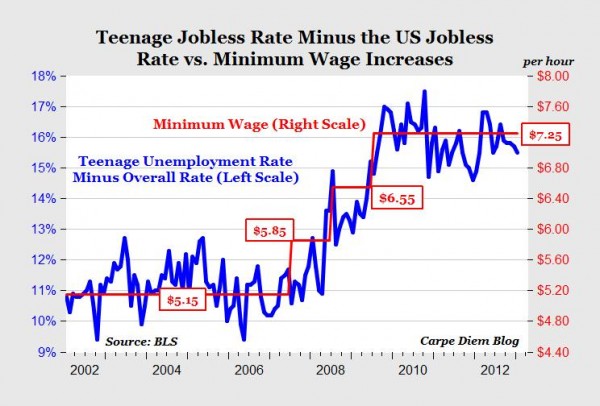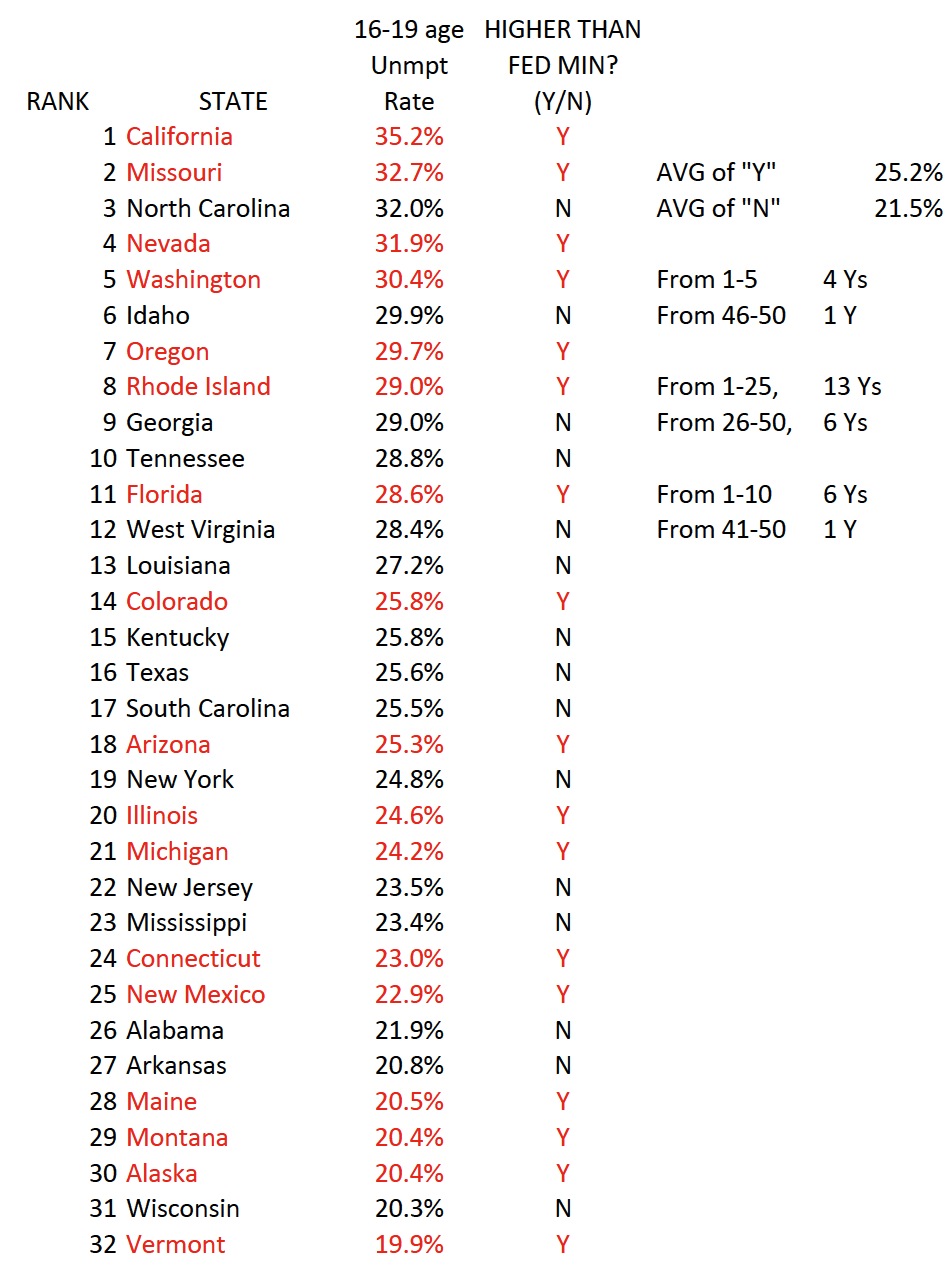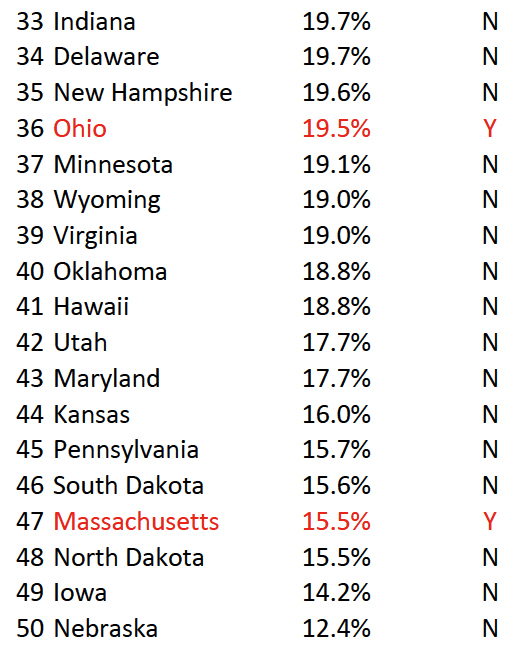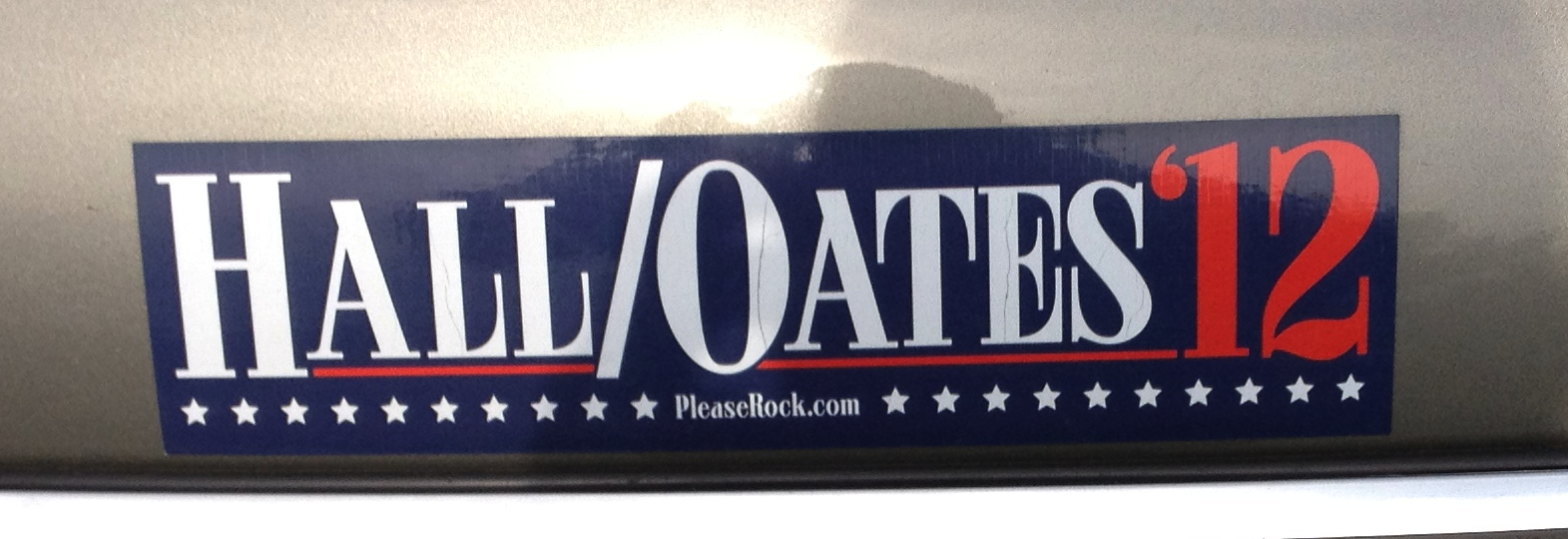Even More Thoughts on the Minimum Wage
I am still in a mild state of shock that so many professional economists apparently doubt that demand curves slope downward. I admit upfront that I have not spent more than an hour or so looking through the latest literature reviews on the topic. Nonetheless, I remain unrepentant: I think increasing the price of unskilled labor by 24% will make employers hire fewer labor hours. The burden of proof is on the doubters to show why this isn’t so.
In addition to the compelling logic of “demand curves slope downward,” we also have the casual empiricism of my last post, and now we’ve also got the below chart (brought to my attention by John S in the comments), taken from an AEI blog post but not sure who the original creator is:

Wow, look at that. It’s almost as if employers respond to incentives on the margin.
It’s true, there are papers that look at “natural experiments” and somehow throw away logic and evidence such as the above chart. Let me run through some issues quickly:
Monopsony. One claim is that the Econ 101 logic breaks down because employers have market power. But hang on a second. If you want to tell me that the wages of, say, brain surgeons are below the competitive equilibrium, since there are only a few employers who can form a cartel, then OK I’ll at least give you a few moments to make your case. But you’re telling me there is a cartel of employers who are willing to hire unskilled labor?! That is literally the most non-specific factor of production on planet Earth. You need labor for everything, and by definition, unskilled labor is not suited for one occupation more than another.
I think the reason this might initially sound plausible to people, is that there aren’t a lot of teenagers working all over the place. You just see them concentrated in a few areas, like fast-food restaurants. But do you know why? Because of the ()#%$#$ minimum wage (and school attendance laws)!
You actually do see young people in various professional businesses and halls of government. They’re called interns. So we’ve got lots of young people finding employers willing to take them on at $0/hour, and yet apparently there is this “indeterminate bargaining zone” where employers’ quantity of labor demanded is the same between 1 cent and $7.25 (or $9). Does this range also count as a “modest increase”? Or does even Krugman admit that getting rid of the minimum wage altogether would help reduce the 25%+ teen unemployment rate, while increasing it from $7.25 to $9 would be negligible in the other direction?
Studies look at employment growth, not unemployment rates. Apparently the standard thing to do in these studies is look at how much the absolute amount of employment or labor hours changes, rather than looking at the unemployment percentage. The idea (I gather) is that a high minimum wage can draw people into the labor market who can’t find a job, but these people wouldn’t have had a job anyway, so it’s not a strike against the system. Only if employers actually reduce the quantity demanded, can we say (some) workers are hurt. But even on its own terms, this argument fails. The most desperate, vulnerable people are the ones who will work for, say, $5/hour. At that rate, fewer middle-class college kids will enter the labor market. But bump up the wage rate to $7.25, and now a bunch of suburban white kids take a part time job at Pizza Hut to make a little extra money. Even if the total payroll and hours worked doesn’t change, it still means these kids bump out the new immigrant who barely speaks English and needs to get his foot in the door to establish a work history.
Studies correct employment growth for broader trends. My very quick reading of the literature suggested that the empirical studies in the olden days did find a strong connection between a minimum wage hike, and reduced hiring among teens. But, the newer wave of studies disputes that finding. One of the “corrections” the new studies make, is to adjust the change in teen hiring compared to the broader labor market, which presumably isn’t affected by a minimum wage hike. Yet hang on a second. Even in the “natural” experiments, I would imagine a state legislature that jacks up the minimum wage is also more likely to do other “progressive” things that hurt employment growth. So things still move in the same direction, but now you’re not going to get as clear a signal; it’s hard to disentangle why the teenagers in California can’t get a job–is it because of the minimum wage hike, or because of their outrageously progressive income tax code?
Studies focus on fast-food employment across county or state lines. Again, I am not claiming to be an expert on this stuff, but it looked like a lot of the really “compelling” studies looked at natural experiments where you had similar conditions except a chain of restaurants fell in one jurisdiction that raised its minimum wage, while the other restaurants in the chain fell in an adjacent jurisdiction that didn’t. Seems like a perfect laboratory test right? But hang on. If the minimum wage in one state makes it profitable for the restaurant to bite the bullet and install a bunch of labor-saving machinery (like the drink dispensers that you put the cup under and hit a button and walk away, unlike what they used to do when I was growing up where you had to hold the cup in place on the nozzle), then it would be pretty easy for that restaurant chain to use the same, new design when opening up new locations in other states with the original minimum wage. By the same token, even longitudinally looking at the same actual restaurant, once they redesign the place to be run by (say) 4 responsible teenagers and a manager, instead of (say) 9 goof-off teenagers and a manager, then even if that state later abolishes its higher-than-federal minimum wage, the damage is done; the restaurant isn’t going back to the old model.
How does this square with the Keynesian story about monetary stimulus? Finally, how the heck does this whole minimum wage digression line up with Krugman et al. constantly telling us that the problem in Europe and elsewhere, is that wages are too high relative to the price level? They tell us that if we engage in a currency war, we’ll all be better off because prices will rise, making it profitable for employers to hire once again. So, are they saying prices will need to rise by more than 24 percent, in order for the teen unemployment rate to budge?
I’m sorry, I just get the feeling that the story changes to fit the progressive policy of the day. And again, I am not burying my head in the sand and refusing to accept something obvious: On the contrary, I am saying demand curves slope downward, and I can point to all sorts of obvious evidence to back that up. Indeed, the Keynesians themselves think employers follow the same logic I’m talking about, when it comes to their proposals for monetary stimulus.
Yet somehow, the old empirical consensus on the minimum wage has been overturned by a wave of new studies of “natural experiments,” so I’m giving reasons in this post why those studies might be missing the obvious conclusion staring us all in the face: Making teenagers 24% more expensive in the middle of a depression is not the way to help teenagers.
Further Thoughts on the Minimum Wage
Daniel Kuehn repeated a statement from an Economix blog post, saying that, “In fact, in 2000 only 46 percent of American Economic Association members agreed with the idea that the minimum wage increases unemployment.”
That struck me as inconceivable. I could *possibly* believe that as of 2000, only 46% of AEA members thought the minimum wage was bad policy–but to say only 46% believed it increased unemployment?! (Note that those are distinct claims.)
If you go to Wikipedia you can see a more nuanced statement of the result (which I’ve put in bold), as well as the general historical progression:
Until the 1990s, economists generally agreed that raising the minimum wage reduced employment. This consensus was weakened when some well-publicized empirical studies showed the opposite, although others confirmed the original view. Today’s consensus, if one exists, is that increasing the minimum wage has, at worst, minor negative effects.[76]
According to a 1978 article in the American Economic Review, 90 percent of the economists surveyed agreed that the minimum wage increases unemployment among low-skilled workers.[77]
A 1992 survey by published in the same journal revealed 79% of economists in agreement that a minimum wage increases unemployment among young and unskilled workers.[78]
A 2000 survey by Dan Fuller and Doris Geide-Stevenson reports that of a sample of 308 economists surveyed by the American Economic Association, 45.6% fully agreed with the statement, “a minimum wage increases unemployment among young and unskilled workers”, 27.9% agreed with provisos, and 26.5% disagreed. The authors of this study also reweighted data from a 1990 sample to show that at that time 62.4% of academic economists agreed with the statement above, while 19.5% agreed with provisos and 17.5% disagreed. They state that the reduction on consensus on this question is “likely” due to the Card and Krueger research and subsequent debate.[79]
A similar survey in 2006 by Robert Whaples polled PhD members of the American Economic Association. Whaples found that 37.7% of respondents supported an increase in the minimum wage, 14.3% wanted it kept at the current level, 1.3% wanted it decreased, and 46.8% wanted it completely eliminated.[80]
Another survey in 2007 conducted by the University of New Hampshire Survey Center found that 73% of labor economists surveyed in the United States believed 150% of the then-current minimum wage would result in employment losses and 68% believed a mandated minimum wage would cause an increase in hiring of workers with greater skills. 31% felt that no hiring changes would result.[81]
P.S. People are saying modest increases won’t hurt employment. Since when is a 24% hike “modest”? Let’s take the estimates at face value. What do people think the employment effects will be? “Only” 50,000 teenagers thrown out of work?
Sweet Cuddly Steve Landsburg
This is the mushiest interview with Steve Landsburg you will ever see. A great part:
I like to say that when you’re stuck in traffic on a hot
summer night, it’s very easy to remember that the guy in
front of you is imposing the costs, and, unfortunately, you
also easily forget that the guy who invented air conditioning
has conferred on you quite a benefit. You remember that if
the guy in front of you had never been born, your life would
be a little easier right now — but it’s also easy to forget that
if one less person had been born it might very well have been
the guy who would’ve invented air conditioning, not the guy
who’s in front of you. So, the real way in which people get
this wrong, I think, is that the mind immediately goes to the
fact that there is such a thing as too large a population. And
there is such a thing as a population so large that the earth
cannot support it — we all know that. But that does not
address the question of whether the current population is
too large or too small. And somehow people often confuse
one of those questions with the other. I’m not sure why, but
I’m out to unconfuse them.
Steve’s claim to fame is his classic The Armchair Economist but libertarians might enjoy his Fair Play more. In this post I give some cool quotes from that later book.
Libertarians and Religion: An Airing of Grievances
On Facebook the other day somebody in my news feed had a status that was something like, “I can’t believe how many big name libertarians are religious. Don’t they know in a free market, most churches would be sued for fraud?” What was more intriguing was that a few people that I consider personal friends gave the guy a high five in the comments.
This is typical, as anyone on Facebook knows. So, I am dedicating this post to an airing of grievances. I was raised Catholic, then was a self-declared “devout atheist” for many years, and now I’m a born again Christian. But through it all, I never felt either the passion or the hatred for organized religion that apparently inspires so many libertarians.
I’m not being sarcastic, and I’m not going to argue with you (I can’t stop others from doing it in the comments), but I want to know why this irks so many libertarians in particular.
I Get Empirical on Minimum Wage
So Paul Krugman et al. are telling us that the empirical literature shows that minimum wage laws don’t have a discernible impact on teen unemployment. Yet another right-winger myth flushed down the toilet.
I went and looked at the paper Krugman says documents this fact. I was a little concerned because it seemed to be saying (I’m paraphrasing of course) that yes, if you just naively look at the states that have higher minimum wage laws, then they have lower employment growth, but once you correct for the broader trends in employment growth among states, then the impact of the minimum wage laws per se disappears. For example, it might just so happen that states that have bad weather, also have state-level minimum wage laws higher than the federal floor, and so earlier researchers incorrectly blamed the low employment growth on the minimum wage burden.
This sounded a little fishy to me, so I decided to do my own, very naive, straightforward look at the data. I first used this map from the Department of Labor to organize the 50 states into two groups: Those with minimum wages higher than the federal level, and all others. (The map says it’s accurate as of January 1, 2013.) Then I downloaded the Local Area Unemployment Statistics from the BLS to get state-level data broken down by age. I used this Excel table to get the unemployment rate among 16-19 year olds by state. Here’s what I found–and I am sorry but putting the two PNG files together is the only way I can figure out to present this quickly:


These results are pretty striking. First of all: Notice how high the teen unemployment rate is, across the country. If minimum wage laws have no effect, why should this be so? I am not denying that Krugman could come up with some story, but prima facie this fact in and of itself is a feather in the cap of the Econ 101 textbooks. (Specifically, we’d expect 16-19 year olds to have the lowest productivity, and so they would be disproportionately hurt by an absolute minimum wage law.)
Now then, if we look at the 19 states that have a minimum wage higher than the federal minimum, the average unemployment rate among teens is 25.2%. In contrast, if we look at the 31 states that have either no state-level minimum wage or one that equals the federal level, the average teen unemployment rate is 21.5%. A pretty big difference, and this is from sample sizes of 19 and 31. It’s not as if you’ve got California driving the result. (And of course, last time I checked, California had pretty nice weather.)
But beyond the arithmetic averages is the clustering of the states, in their respective groups, when you rank them from the highest to lowest teen unemployment rates. The most striking result to me: If you look at the top 5 and the bottom 5, you find: Four of the top five states have higher-than-federal minimum wages, while only 1 out of the bottom five does. I’m not sure how to set up the statistical problem, but I think that would be an incredibly unlikely result, if minimum wage laws had nothing to do with teen unemployment rates.
Furthermore, if you look at the top and bottom 10, you get: Out of the top 10, six of them have higher-than-federal minimum wages, while out of the bottom 10, only 1 does.
And then, just looking at the top and bottom halves: The top half has 13 states with higher-than-federal minimum wages, while the bottom half has the other 6.
Before you guys go shouting these results from the mountaintops, I really would appreciate it if somebody could reproduce my results. I did this fairly quickly Saturday night, and it’s possible I mislabeled one of the states etc. But these seem like pretty powerful results, especially since they back up what is literally textbook economics. So if someone could double check my work, that would make me more confident in publicizing this.
Two Views on Minimum Wage Hikes
(This post is taken from the heavy lifting David R. Henderson performed.)
Here’s an economist talking about the textbook view of the minimum wage, and how we should take the (in)famous Card & Krueger results with a grain of salt:
So what are the effects of increasing minimum wages? Any Econ 101 student can tell you the answer: The higher wage reduces the quantity of labor demanded, and hence leads to unemployment. This theoretical prediction has, however, been hard to confirm with actual data. Indeed, much-cited studies by two well-regarded labor economists, David Card and Alan Krueger, find that where there have been more or less controlled experiments, for example when New Jersey raised minimum wages but Pennsylvania did not, the effects of the increase on employment have been negligible or even positive. Exactly what to make of this result is a source of great dispute. Card and Krueger offered some complex theoretical rationales, but most of their colleagues are unconvinced; the centrist view is probably that minimum wages “do,” in fact, reduce employment, but that the effects are small and swamped by other forces.
What is remarkable, however, is how this rather iffy result has been seized upon by some liberals as a rationale for making large minimum wage increases a core component of the liberal agenda…Clearly these advocates very much want to believe that the price of labor–unlike that of gasoline, or Manhattan apartments–can be set based on considerations of justice, not supply and demand, without unpleasant side effects…
…
Now to me, at least, the obvious question is, why take this route? Why increase the cost of labor to employers so sharply, which–Card/Krueger notwithstanding–must pose a significant risk of pricing some workers out of the market, in order to give those workers so little extra income? Why not give them the money directly, say, via an increase in the tax credit?
…
In short, what the living wage is really about is not living standards, or even economics, but morality. Its advocates are basically opposed to the idea that wages are a market price–determined by supply and demand, the same as the price of apples or coal.
Just today, Paul Krugman offers a decidedly different take on how we should interpret the Econ 101 textbooks and the empirical evidence:
So what should you know? First, as John Schmitt (pdf) documents at length, there just isn’t any evidence that raising the minimum wage near current levels would reduce employment. And this is a really solid result, because there have been a *lot* of studies. We can argue about exactly why the simple Econ 101 story doesn’t seem to work, but it clearly doesn’t — which means that the supposed cost in terms of employment from seeking to raise low-wage workers’ earnings is a myth.
…
So a minimum wage increase isn’t some kind of counsel-of-despair way to help workers a bit in a dysfunctional political scene (although there’s that too); it’s actually good policy.
At this point, surely I don’t need to tell you guys who wrote the first block quote above, do I? It was from 1998.
P.S. Yes, in the first block quote, he’s talking about a “living wage” proposal that means a large increase in the minimum wage, whereas in the second he’s talking about a more modest increase. If you think his readers are picking up on all those nuances, and that this is a consistent economic perspective, you have more faith in humanity than I do.
Thoughts on President Obama’s SOTU Call for a $9 Minimum Wage
Nothing earth-shattering here. As I explained on Facebook, I mostly made this because my last 5 video uploads were karaoke.








Recent Comments